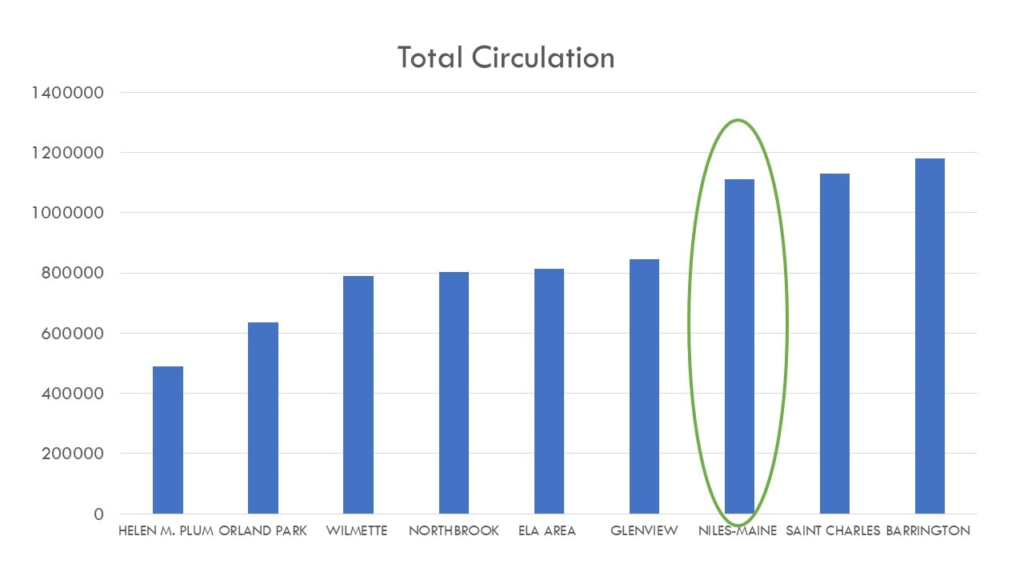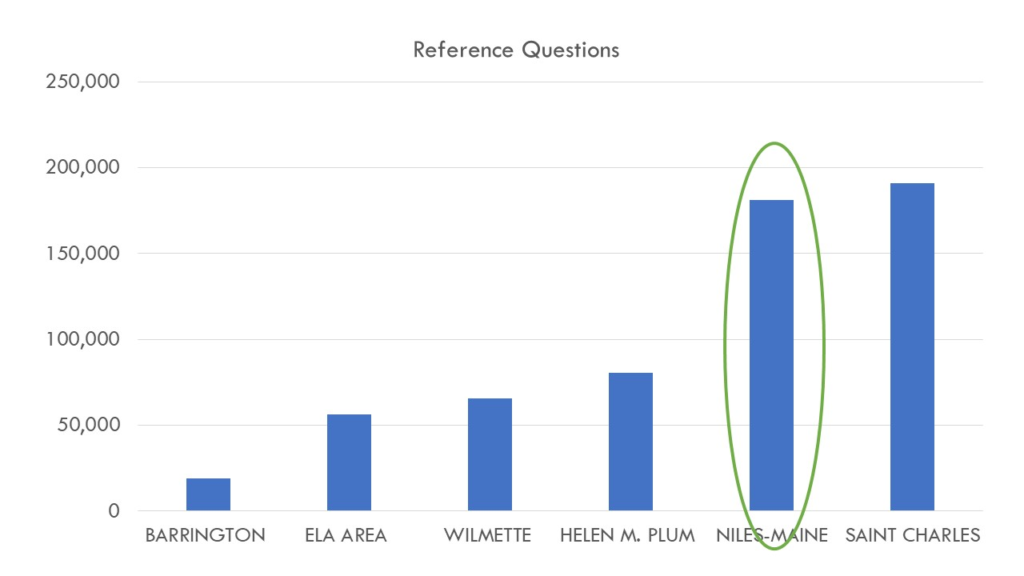Books in multiple languages
In the Village of Niles alone, 55.7% of persons 5 years of age or older speak a language other than English at home, according to the 2015-2019 US Census Survey. The Niles-Maine District Library also includes a large portion of unincorporated Maine Township. At East Maine School District 63, which encompasses much of the unincorporated area within the library district, 80% of the students speak a language other than English at home. Research has shown that reading in your native language actually improves your ability to learn to read in English. The library provides books for education and pleasure to people reading in English. It would be unfair to deny books to taxpayers who read in other languages, especially languages spoken by large numbers of people in the community. To deny this to people on the basis of the language they speak is a form of discrimination.
Yet, this is exactly what library trustee Joe Makula suggested the library do at a candidate forum held during the last election. Asked how he would make the library welcoming to the diverse community, Makula replied, “We should concentrate on people learning English because that’s the language here. Instead of stocking up on books in seven different languages, if we got people to assimilate and learn English better, I think we would do more good than increasing our inventory of foreign language books.”
Unlimited no-bid contract at $100/hour for their buddy
Just days after the new trustees were sworn in, they awarded their campaign worker Steven Yasell an unlimited contract to “Evaluate, Assess and Inventory for (sic) Library Equipment, Systems and Operations”. The professional staff of the library already do that as part of their jobs. If the trustees still believe there is a need for a consultant, there are professionals that provide audits for businesses, non-profits, and government agencies, but their friend is not one of them. He usually handles wedding photography and videography. There is no way he can provide an independent and transparent assessment of the library. This is the definition of corruption and a waste of taxpayer money.
Repairs to the building
The library is badly in need of repairs to its roof. Experts that assessed the roof warned that another winter might lead to collapse. There are other libraries that have not made necessary repairs to their roof and suffered greater damage and costs when they collapsed. This is why the former board dedicated much of its time to researching the issue. They went through a formal bidding process, looked at a green roof option (which turned out not to be cost effective), and settled on a contract for about $17/square foot. This kind of repair is expensive and the new trustees took advantage of the price tag to scare voters. The new trustees have claimed, despite hours of presentations from experts, that the repairs are unnecessary and too expensive. Putting off these repairs or failing to do them at all puts the library at risk of a crisis, potential damage to furniture, books, and other material, repairs that exceed the cost of fixing the roof, and even a potential lawsuit. Similar objections were made to the cost of fixing the library’s phone system, which also covers internet access. Experts have explained that it is on the brink of collapse and could leave the library with no phones or internet access without notice. Again, the new trustees have objected to spending money on this until there is an emergency. We believe that it is better fiscal policy and customer service to address repairs before there is a crisis.
Your tax dollars
The library is only a fraction of your tax bill. Even if major cuts were made to the library budget, it would have a minimal impact on the taxes you pay. For example, if $1 million was cut from the library budget, the average household in Niles would only see a reduction of about $40 a year. This is because the vast majority of your tax dollars go to the village and the school districts, with budgets that dwarf the Niles-Maine District Library. While the trustees have been fighting needed repairs to the library roof and phone system that together cost under $1 million, the village spent $27 million last year on updates to street lighting and a new police facility. The only people that will be impacted by cuts to the library’s budget are the people who love and rely on its services.
The library is popular with comparatively high levels of use compared to similar libraries
The pandemic has had a big impact on the library and the way it’s used, but before it was a busy and well-used community resource. The data below comes from a database created by the Institute of Museum and Library Services (imls.gov) called “Search & Compare.” It brings data together from every library in the country. We selected for suburban libraries in Illinois that have only one building and that have a total revenue within 1 million of ours. Niles has some of the highest levels of circulation, reference questions answers, and program attendance.



During the campaign, trustees tried to convince voters that the library was not being used, because only 25% of residents have a library card. It’s important to know that 25% still represents over 14,000 people. Cardholders are also not a good measure of use. It’s common for a family with multiple members to use one card and there are many ways to use the library without a card. That’s why professionals also look at program attendance, circulation, and reference questions.
Why it’s important to include non-cardholders
At first, it might seem normal for the board to limit services to residents and cardholders. But this is actually a very harmful and not at all ordinary limit. Our community extends beyond the limits of the district and our residents may have barriers to getting a card, but still need the services at the library. Most libraries recognize that it is to the benefit of their patrons to be open to residents of other communities, which is why anyone who lives here can also use the libraries in Skokie, DesPlaines, Park Ridge, and other suburbs. Here are a few examples of times when we clearly want someone without a library card to have access to the library:
- A parent may rely on family from a neighboring suburb to watch their children. The collections and programs should still be available to the children, even if grandparent, aunt, or babysitter is with them.
- Because the school districts and library districts don’t align perfectly, there are students from multiple libraries in one school. It wouldn’t be practical or useful to our residents to serve some students in a classroom and exclude others.
- Some teenagers have parents that are unable to come to the library to sign them up for a library card due to their work schedule or other factors. And teens often don’t have the necessary ID and paperwork. We still want them to be able to access the space, homework help, and programs to enrich their learning.
These are just a few examples, but they help highlight the importance of making as much of our materials, programs, and resources as accessible as possible.
